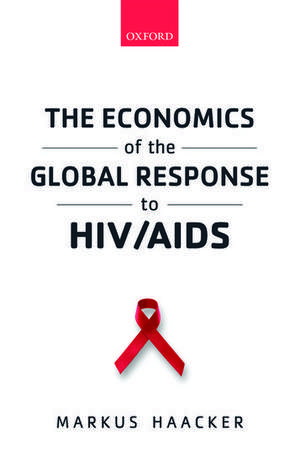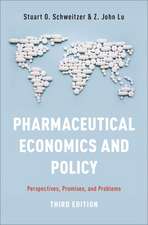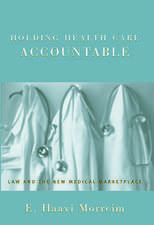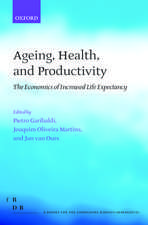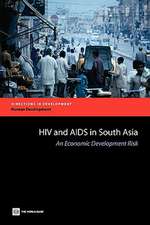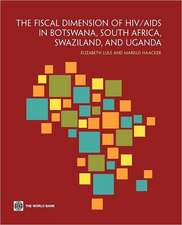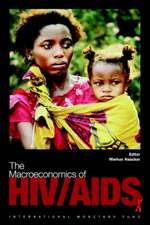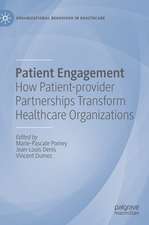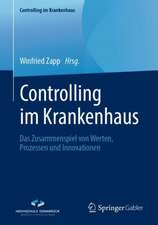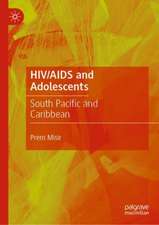The Economics of the Global Response to HIV/AIDS
Autor Markus Haackeren Limba Engleză Hardback – 16 iun 2016
Preț: 420.96 lei
Preț vechi: 579.52 lei
-27% Nou
Puncte Express: 631
Preț estimativ în valută:
80.55€ • 86.14$ • 67.16£
80.55€ • 86.14$ • 67.16£
Carte tipărită la comandă
Livrare economică 07-14 aprilie
Preluare comenzi: 021 569.72.76
Specificații
ISBN-13: 9780198718048
ISBN-10: 0198718047
Pagini: 304
Ilustrații: 44 Figures and 14 Tables
Dimensiuni: 170 x 235 x 22 mm
Greutate: 0.59 kg
Editura: OUP OXFORD
Colecția OUP Oxford
Locul publicării:Oxford, United Kingdom
ISBN-10: 0198718047
Pagini: 304
Ilustrații: 44 Figures and 14 Tables
Dimensiuni: 170 x 235 x 22 mm
Greutate: 0.59 kg
Editura: OUP OXFORD
Colecția OUP Oxford
Locul publicării:Oxford, United Kingdom
Recenzii
Haacker's contribution is the most thoughtful, forward-looking, and practically-oriented treatise on the economics of HIV/AIDS to appear in years. It offers an up-to-date economic review of alternative HIV/AIDS interventions and provides a valuable framework for designing context-specific prevention and control strategies. Haacker's book is must reading for anyone interested in the economics of HIV/AIDS, and global health more generally.
As the architecture of the global AIDS response changes, the economic perspectives have become very important. Markus Haacker provides a timely analysis of critical issues challenging countries in the most affected region of the world - effectiveness, efficiency, sustainability, and the future of the AIDS response . . . an essential read for all health professionals and policy makers.
This is a timely and well researched book on an issue that will remain of relevance to large populations, not least in Africa, for many decades.
Markus Haacker provides a very thoughtful analysis of the global AIDS response, not only of the economics, but also of the complex politics. As the AIDS response is changing and at risk of complacency, it is essential that we learn lessons from the past.
AIDS is the most studied epidemic in history. Since the virus was identified in 1983, there has been heated debate on the economic causes and consequences of the illness. In this masterly book Haacker assembles and interprets the latest data. It is a sobering must read for economists, public health professionals, and domestic and donor governments.
Markus Haacker delivers a much-needed comprehensive economic and financial analysis of the HIV epidemic. It will join the must read list for anyone with serious interest in the economics of this unprecedented epidemic. Dr Haacker has traced the economic and fiscal impacts of the HIV epidemic since its outbreak. He uses cost-effectiveness analysis to provide a framework for decision-making, while cogently explaining the complexities of using such tools for a disease that is transmissible, life-long, and heterogeneously distributed among and between populations.
As the architecture of the global AIDS response changes, the economic perspectives have become very important. Markus Haacker provides a timely analysis of critical issues challenging countries in the most affected region of the world - effectiveness, efficiency, sustainability, and the future of the AIDS response . . . an essential read for all health professionals and policy makers.
This is a timely and well researched book on an issue that will remain of relevance to large populations, not least in Africa, for many decades.
Markus Haacker provides a very thoughtful analysis of the global AIDS response, not only of the economics, but also of the complex politics. As the AIDS response is changing and at risk of complacency, it is essential that we learn lessons from the past.
AIDS is the most studied epidemic in history. Since the virus was identified in 1983, there has been heated debate on the economic causes and consequences of the illness. In this masterly book Haacker assembles and interprets the latest data. It is a sobering must read for economists, public health professionals, and domestic and donor governments.
Markus Haacker delivers a much-needed comprehensive economic and financial analysis of the HIV epidemic. It will join the must read list for anyone with serious interest in the economics of this unprecedented epidemic. Dr Haacker has traced the economic and fiscal impacts of the HIV epidemic since its outbreak. He uses cost-effectiveness analysis to provide a framework for decision-making, while cogently explaining the complexities of using such tools for a disease that is transmissible, life-long, and heterogeneously distributed among and between populations.
Notă biografică
Markus Haacker is an economist working at the intersections of macroeconomics, global health, public finance, and economic development. He is a Visiting Scientist at the Harvard School of Public Health, has worked for the International Monetary Fund and as a consultant for the World Bank and UNAIDS, and holds a PhD in Economics from the London School of Economics.
